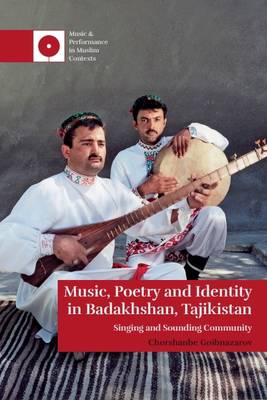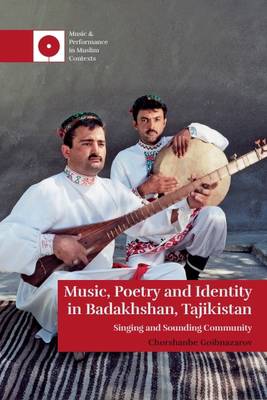
- Afhalen na 1 uur in een winkel met voorraad
- Gratis thuislevering in België vanaf € 30
- Ruim aanbod met 7 miljoen producten
- Afhalen na 1 uur in een winkel met voorraad
- Gratis thuislevering in België vanaf € 30
- Ruim aanbod met 7 miljoen producten
Zoeken
Music, Poetry and Identity in Badakhshan, Tajikistan
Singing and Sounding Community
Chorshanbe Goibnazarov
€ 193,45
+ 386 punten
Omschrijving
In the riverine valleys of the Pamir Mountains of Tajik Badakhshan, a thriving millennium-old community of Nizari Ismaili Muslims created a unique spiritual culture in which the performance of music and poetry plays a central role. This book focuses on the central musical and poetic tradition of the Pamiri Ismailis, qasīda-khonī (also known as maddo), tracing its origins, evolution, and eventual delocalization and relocation in new social contexts. The first study on the musical culture of the Pamiri Ismailis in almost 20 years, this monograph introduces readers to leading performers of qasīda-khonī and to the Ismaili gnosis that inspires its music and poetry--a foundational source for an understanding of Islam in Badakhshan as an amalgam of diverse cultural practices and multi-layered identities. In an era of cultural globalization, the circulation of qasīda-khonī and maddo beyond Badakhshan serves as a case study of global cultural flows, diversity, versatility, and connectedness.
Specificaties
Betrokkenen
- Auteur(s):
- Uitgeverij:
Inhoud
- Aantal bladzijden:
- 288
- Taal:
- Engels
- Reeks:
Eigenschappen
- Productcode (EAN):
- 9781399533881
- Verschijningsdatum:
- 31/07/2025
- Uitvoering:
- Hardcover
- Formaat:
- Genaaid
- Afmetingen:
- 156 mm x 234 mm
- Gewicht:
- 580 g

Alleen bij Standaard Boekhandel
+ 386 punten op je klantenkaart van Standaard Boekhandel
Beoordelingen
We publiceren alleen reviews die voldoen aan de voorwaarden voor reviews. Bekijk onze voorwaarden voor reviews.








